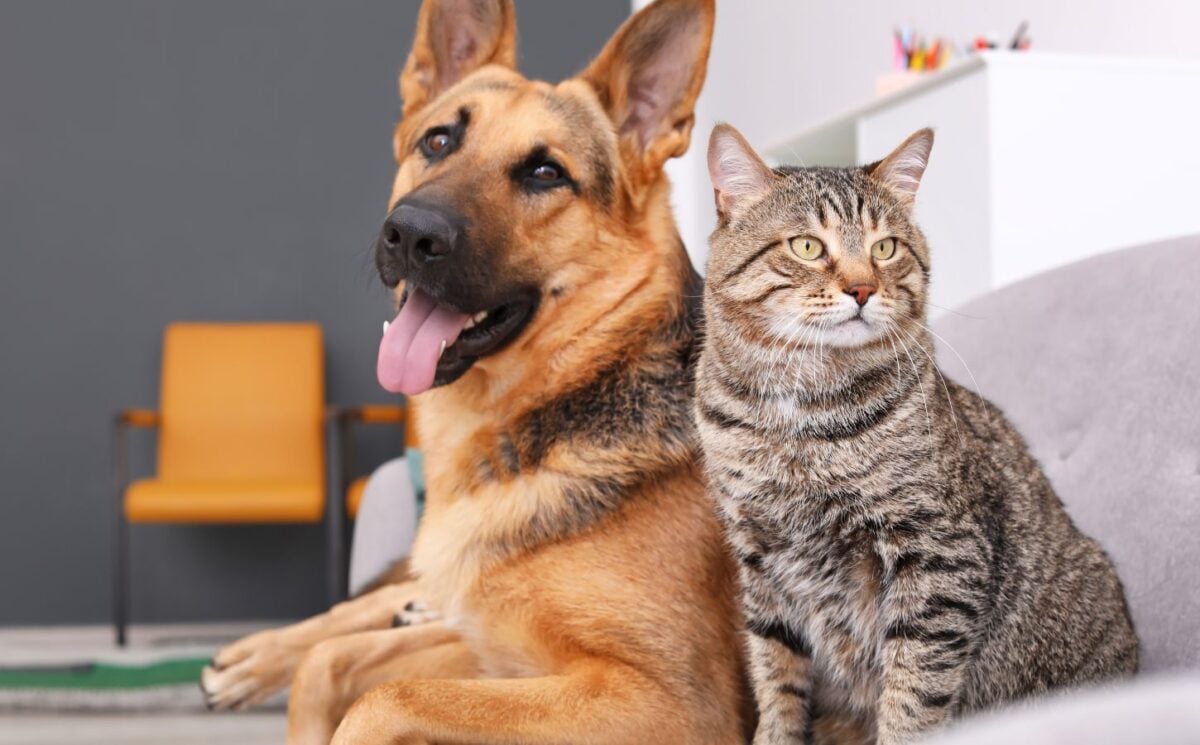The impact of our diets on animal suffering and environmental sustainability is well-known. The science is clear: to prevent the suffering and death of trillions of animals annually, and to combat the climate crisis, we need to shift to a plant-based diet. But what about our dogs and cats?
Read more: Hot Weather Poses ‘Huge Threat’ To Flat-Faced Dogs, Charity Warns
When you think about meat consumption, you may not naturally think about canine and feline diets. But you have good reason to. Globally, nine percent of all farmed land animals are slaughtered for pet food. In wealthy countries like the U.S., where more people have companion animals, this rises to 20 percent.
This means that seven billion land animals and many (probably billions) more fishes* are killed every year to feed the world’s dogs and cats. And they have an environmental “pawprint” to match. If all the world’s dogs and cats went vegan, we could save more greenhouse gas emissions than all emissions from the UK and New Zealand combined.
Until recently, it was assumed that we couldn’t mitigate the negative impacts of meat-based diets for dogs and cats, since they couldn’t maintain good health on a plant-based diet. But in recent years, a new, strong, and growing body of research is showing that dogs and cats on vegan diets generally enjoy health outcomes as good as or better than those on conventional meat-based diets.
Given the benefits for farmed animal welfare, companion animal health, and environmental sustainability, it is becoming increasingly clear that we should transition our dogs and cats onto nutritionally-sound plant-based diets.
Veterinary organisation criticizes vegan diets for dogs and cats

But a recent blog authored by veterinary nurse Robyn Lowe of Veterinary Voices UK questions this research and the conclusion that dogs and cats should be fed a vegan diet. In her blog titled “Vegan Diets are Healthier and Safer for Cats and Dogs – Or Are They?,” she criticises many elements of this research and cautions against the use of vegan diets for dogs and cats.
It is worth noting that the veterinary community is becoming increasingly open to vegan companion animal diets. Earlier this year, in response to the weight of evidence supporting nutritionally-sound vegan diets for dogs, the British Veterinary Association ended its opposition to these diets.
While healthy scrutiny and debate is welcomed in any scientific field, these criticisms are overblown and appear ignorant of the rigour of the research, and the importance of the findings for farmed and companion animals. Lowe neglects the broader literature, and focuses on limitations that were already acknowledged and mitigated in these studies.
This is problematic. Rapid climate change and the growth of animal agriculture are both urgent global issues. The stakes are high, and avoiding confusion or misinformation is crucial.
We therefore take this opportunity to counter the criticisms in Lowe’s blog, and clarify the findings of the research on whether we should feed our dogs and cats a vegan diet.
Read more: UK Issues ‘Snake Warning’ – Here’s Why They Should Never Be ‘Pets’
Veganism isn’t an ideology
Lowe critiques two studies in the literature, both of which were large-scale survey based studies of dog and cat guardians authored by Knight et al. (2022; 2023). She begins by arguing that we should take this research with a pinch of salt simply because the lead researcher follows a vegan diet, which she describes as an “ideological position” which “inevitably introduces a risk of bias”. This claim is inappropriate and misleading. By this logic, if Lowe eats animals herself, should we caveat her critiques as being influenced by her inherent meat-eating bias?
There is overwhelming scientific evidence that animal farming and fishing causes very significant suffering to trillions of animals annually, and is a leading contributor to the climate crisis. Veganism is not an ideological position – it is the logical scientific solution to the threats that animal agriculture poses. The fact that the lead author is vegan is not a sign of “ideological bias” and does nothing to detract from the rigour or credibility of this research, which is published in PLOS ONE, a leading peer-reviewed scientific journal.
Lowe also points towards the studies’ funder – ProVeg International – as another reason to dismiss the findings, since ProVeg International advocates for a more plant-based food system. However, commercial funding of nutrition (and broader medical) studies is extremely common. Most research probably would not proceed without such financial support. In this case, the funder’s contribution was explicitly acknowledged, with the authors confirming that “this funder played no role in study conceptualisation, design, data collection and analysis, preparation of resultant manuscript nor decisions relating to publication”.
Ignorance of the broader scientific literature
Lowe cautions the conclusion that we should feed companion animals vegan diets by stating that “we are in the infancy of knowledge about these diets.” This reveals a lack of awareness of the other studies in this field. By late 2024 there were 11 studies, including multiple clinical and large-scale survey studies, showing health benefits for dogs on vegan diets, and three studies for cats. More information on all these studies is available here.
On top of this, there is a systematic literature review on this topic that concluded there is “no overwhelming evidence of adverse effects” for dogs and cats on vegan diets and “some evidence of benefits.” It added that “beneficial findings were relatively consistent across several studies and should, therefore, not be disregarded.”
In reality, we now have more studies showing positive health findings for dogs and cats fed vegan diets than we do for many other commonly accepted diets and veterinary products, which are normally supported by very few, if any, published, peer-reviewed scientific studies. In contrast, by late 2024 there were 14 studies showing health benefits for dogs and cats fed vegan diets, as well as a positive systematic literature review.
Lowe also briefly references a paper that finds nutritional inadequacies in vegan pet foods. However, this study was limited to the Brazilian market and so is not generalizable to the UK. A comprehensive global study analyzing the nutritional soundness of meat-based and vegan pet foods found that most are fairly well-made, with vegan pet food being slightly more likely to be nutritionally-sound and of good quality.
What about cats?

There is some confusion over the dietary needs of cats, and whether they require a meat-based diet.
Lowe states that “cats … are obligate carnivores, and therefore need specific amino acids to survive”. It is worth noting that dogs, and indeed humans, also need specific amino acids to survive (dogs need 10, and humans nine).
Lowe continues that “cats lack the ability to synthesise (make) a number of important nutrients”. However this statement is applicable to dogs as well, and indeed virtually all species, which rely on obtaining certain nutrients through their diet.
The key point is that cats (like any other animal) need certain nutrients, not certain ingredients, to survive. As obligate carnivores, some of these nutrients are not naturally occurring in plant-based foods. However, provided a vegan cat food is synthetically supplemented with these nutrients (such as taurine, or vitamin A) to ensure nutritional completeness, there is no reason why cats cannot meet all their nutritional needs on these diets.
Indeed, to date, three peer-reviewed scientific studies using both large-scale survey and clinical data have found that cats fed nutritionally-sound vegan diets enjoy health benefits as good as or better than those on conventional meat-based diets.
For those who feel wary about the idea of synthetic supplementation, it is worth noting that meat-based cat foods are also synthetically supplemented with taurine and other essential nutrients. This is because the high temperatures and pressures used during processing can degrade naturally occurring taurine, and other fragile nutrients. Synthetic supplementation is a standard and safe part of pet food formulation and is necessary to meet an animal’s nutritional needs.
The benefits and limitations of survey-based studies
Lowe specifically criticizes two studies which used large-scale surveys to gather guardian-reported health data on dogs and cats fed meat-based and vegan diets. Many of Lowe’s criticisms relate to this methodology and its limitations. It is worth noting that the limitations of guardian-reported data were covered extensively in the studies themselves. For clarity, though, we address them again here.
Guardian-reported data is valuable
Lowe argues that it is “expected” that vegan cats will score better on “all health measures” when using guardian-reported survey data. This is another example of sloppy reasoning.
There were many more animals fed meat-based diets in both studies. If it was the case that you can always expect guardians to report positively about their animal’s health, we would actually expect the bias to skew results in the opposite direction, and show that meat-based diets were healthier. In fact, in both studies the opposite was found.
These surveys also contain very large numbers of respondents, which improves the reliability of the results and often allows for statistically significant results. In addition to guardian views on health (which can be prone to conscious and unconscious bias), more objective data such as reported visits to the vet, and reported veterinary assessment of pet health, were also included.
Furthermore, in their 2024 follow-up study of health outcomes in 2,536 dogs, Knight et al. actually studied the consistency of guardian opinions with reported veterinary assessments. These proved to be very similar, although guardians were slightly likelier to consider their dogs to be healthy. Overall, 74.9 percent of guardians agreed with reported veterinary assessments, but 15.2 percent felt their dog was healthier, and 9.9 percent felt their dog was less healthy. For the 1,369 cats they also studied, 74.9 percent of guardians also agreed with reported veterinary assessments. However, 12.8 percent felt their cat was healthier, and 12.3 percent felt their cat was less healthy than the reported assessments of their veterinarians.
Respondent profile and sample sizes
Lowe argues that the fact that vegans are overrepresented in respondent profiles is a source of potential bias. But she also argues that the sample sizes for animals on vegan diets is too small. Since animals on vegan diets mostly have vegan guardians, these two points contradict each other: she is claiming that the percentage of respondents who are vegan is both too large and too small at the same time.
In reality, what matters more here is the quality of the statistical analysis and whether the results are supported statistically.
Statistical significance is only one part of the picture
Lowe cautions against the conclusion that cats can experience health benefits on a vegan diet because the findings in this survey-based cat study aren’t statistically significant (as denoted by a ‘p-value’ below 0.05). But this is not the only statistical metric of importance. The study’s statistical analysis was consistent with state of the art statistical practice and the position of the American Statistical Association on the relevance of p-values, which considers the effect size (in this case, the size of the effect of the vegan diet) to be more important. Effect sizes were moderate to large in the majority of cases. For most general indicators of health, cats on vegan diets accordingly had a “tendency” or a “strong tendency” to have a lower odds of illness occurring compared to cats on meat-based diets, supporting the conclusions that “cats fed vegan diets tended to be healthier than cats fed meat-based diets. This trend was clear and consistent.” For more information on p-values, click here.
Does it matter that these cats lived mostly indoors?
Lowe argues that, because most of the vegan cats were “indoor cats”, they are less likely than outdoor cats to visit the vet (since outdoor cats may sustain more injuries when exploring). However, this neglects the fact that the cat’s primary location was controlled for during the statistical analysis. Indeed, Lowe makes the same critique for the age of vegan cats, who were on average nearly two years younger than cats on meat-based diets, despite the fact that this was controlled for too. This was made clear in the abstract of the paper and elsewhere.
Also made clear was the point that these cats were not fed these diets exclusively. 41 percent received a variety of treats daily, and 13 percent were regularly offered dietary supplements. Additionally, 42 percent overall (33 percent of vegan cats) had significant outdoor access. The authors noted: “It is possible that some cats, especially those in the latter groups, may have supplemented their diets by hunting. Accordingly, it is important to note that our results indicate health outcomes when cats are fed these diet types within normal households, with normal feeding regimes, rather than when cats are exclusively fed each of the two main diet types, as might occur within a controlled study within a research institute.”
Do dogs fed vegan diets visit vets less frequently?
Lowe attempts to critique the 2022 study’s conclusion that guardians who feed raw-meat based diets to their dogs are less likely to visit the vet not because their dogs are necessarily healthier, but also because most vets oppose raw meat diets. She argues that, if the researchers acknowledge this, they should acknowledge the same phenomenon for the guardians that feed vegan diets.
In fact, dogs fed vegan diets were the most likely of any group to be neutered, signifying a strong adherence to veterinary advice, in contrast to guardians feeding a raw-meat based diet, whose dogs were least likely to be neutered. This appears to indicate that guardians feeding vegan diets are more likely to follow veterinary advice and to visit veterinary clinics.
Unfounded health concerns about legume protein diets
Lowe briefly refers to the occurrence of a health condition called dilated cardiomyopathy (DCM) that has been claimed to occur more frequently in grain-free and legume-based dog foods. Little detail beyond this is given, although it is important to state that multiple studies have not found any link between the use of plant-based diets for dogs and DCM. Indeed, in 2022 the United States Food and Drug Administration, which originally suggested the possibility of this link, dropped all research on this question, having not found enough reliable evidence to continue.
Vegan diets for dogs and cats: the evidence-based position
All good scientific studies acknowledge and mitigate their limitations. In focusing so closely on the limitations of just two out of the 14 studies by late 2024 that had demonstrated health benefits for cats and dogs on vegan diets, Lowe missed the broader, more relevant trends in the research.
By late 2024 there were 11 studies on the health impacts of vegan diets for dogs and three for cats, all of which demonstrated similar or superior health outcomes for animals fed vegan diets. Only one additional credible study (in dogs) did not support the conclusion that dogs can be healthy on vegan diets, and it is notable that this was the oldest study, with the smallest sample size.
While any individual scientific study can usually be critiqued, the weight of evidence is clearly in the favour of nutritionally-sound vegan pet food. And while Lowe’s concern for companion animal health is reasonable, her dismissal of the accumulated evidence in this field is not. In the face of this evidence, dismissing the conclusion that nutritionally-sound vegan diets for dogs and cats are a healthy and sustainable option has now become uninformed, irrational, and unscientific.
If you want to follow along with Dr Andrew Knights’s work on plant-based food for companion animals, please visit the campaign site here.
*While the English language typically refers to multiple fishes as “fish,” we use “fishes” to emphasize their individuality
Read more: Vegan Diets Reduce Aggression And Gut Issues In Dogs, Study Suggests







